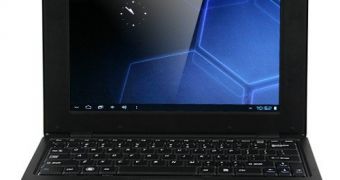Since ARM is closer than ever to powering a series of mobile personal computers, it wouldn't do for us to skip on covering the few precursors to that momentous event, like Rikomagic's MK802 Mini PC.
To be fair, MK802 isn't really a product made by Rikomagic. The company actually takes cheap Chinese gadgets, overhauls their hardware and software and then sells them in the UK and the rest of Europe.
MK802 Mini PC is, for all intents and purposes, a netbook, so we don't really expect many people to flock to it.
Nevertheless, the device does possess a fairly well known heart: the Allwinner A10 processor, with two ARM Cortex-A8 cores clocked at 1.5 GHz each.
1 GB of RAM (random access memory) accompanies the CPU, while the operating system and anything else owners copy on the laptops is stored on four or eight gigabytes of NAND Flash storage.
That is a fairly low capacity for times when 16 GB is considered a low number, but at least there is a memory card slot that allows extra capacity to be added.
That said, Rikomagic has chosen to install Ubuntu Linux 12.04 on the MK802 Mini PC, instead of the normal netbook choice, Windows XP/7 operating system (which doesn't work on ARM anyway), although, curiously, the company will provide Ubuntu even if the netbook ships with Android 4.0 Ice Cream Sandwich.
Then again, Android relies on touchscreen input, which the small trackpad and the keyboard can't really substitute for well. There is also the fact that Ubuntu can be run just fine from a SD card.
Finally, the 10.1-inch liquid crystal display (LCD) boasts a native resolution of 1,024 x 600 pixels, which, again, might seem low compared to tablets and notebooks. Of course, HD, Full HD and beyond can be considered overkill for screens of this size just as easily.
For our part, we think the resolution is a good fit for the rest of the specs (VGA webcam, three USB 2.0 ports, accelerometer, an SD card reader, Wireless, Ethernet port). The only thing we don't like is the short battery life (3 hours), especially knowing that ARM is prized for power efficiency. At least the price will be low (it hasn't been revealed, but we are leaning towards $150 / 121-150 Euro or less).

 14 DAY TRIAL //
14 DAY TRIAL // 